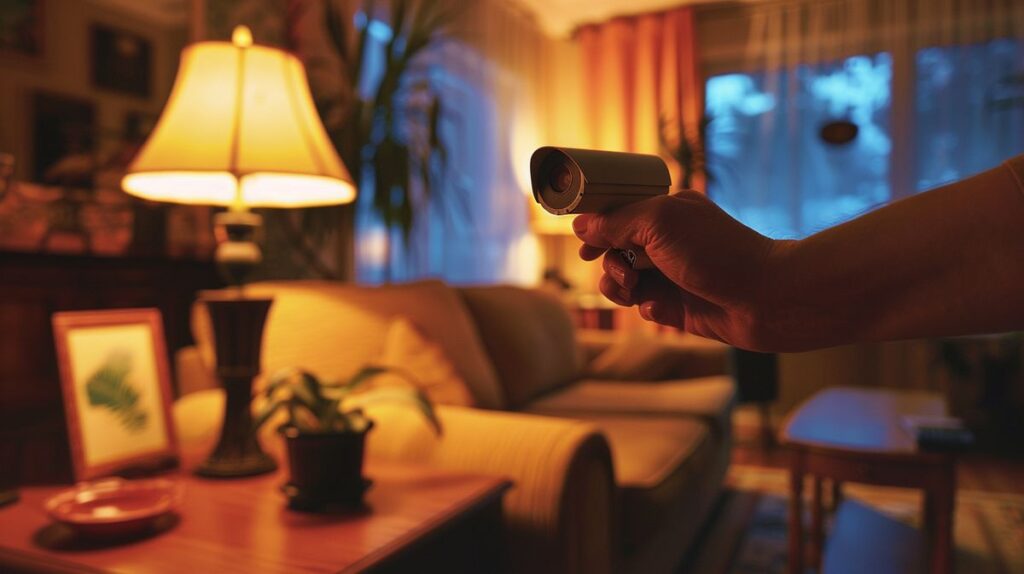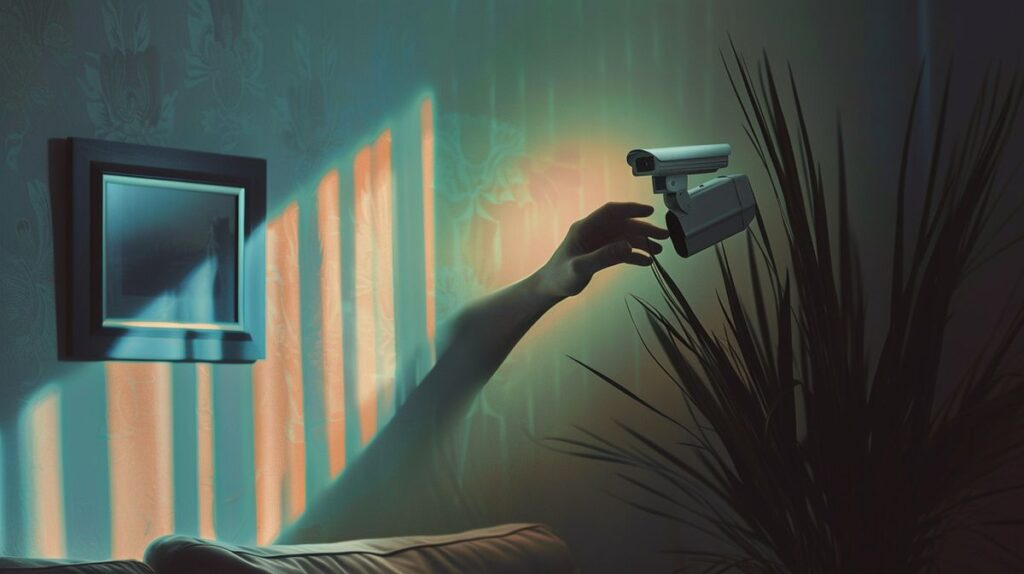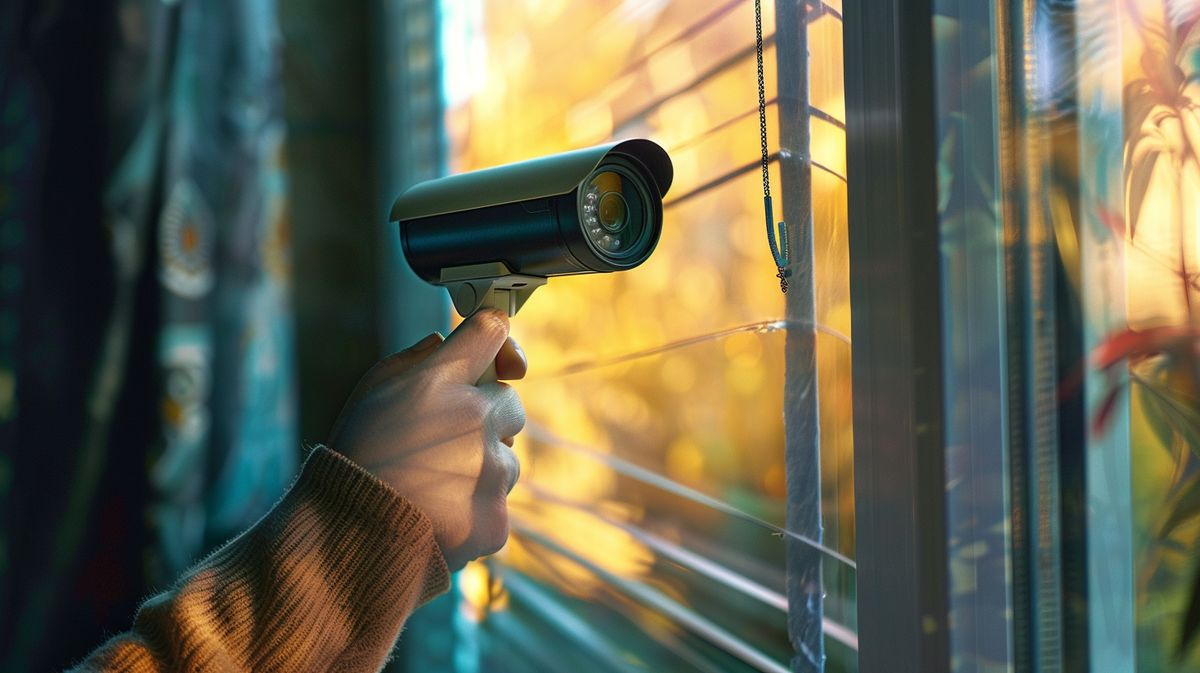Is It Illegal to Install a Camera in Someone’s House Without Permission?
So, can you just install a camera in someone else’s house without permission? To clarify – it’s a blurry line to tread. Let’s shine a light on the intricate landscape of privacy laws with this straight-shooting guide.
In this comprehensive exploration, we’ll decipher when and where surveillance is permissible. Whether you’re a home owner, a landlord, or a temporary guest, the legal repercussions of crossing the line can be punishing.
Now get ready to delve into the details, ensuring that your actions both secure your property and respect everyone’s right to privacy, avoiding nasty surprises down the line. So, shall we get started?
Understanding Expectation of Privacy Laws
Privacy laws can seem complex, but they boil down to where you can expect to be free from prying eyes.
- Think of private spaces like bathrooms, bedrooms, and changing rooms. Here, privacy is paramount.
- Public areas and shared spaces at home don’t offer the same level of privacy.
Private vs. Public Spaces
Ever wondered what makes a space private? It’s all about where you think you can expect privacy.
- Private spaces come with an inherent right to privacy. Installing cameras without permission here is illegal.
- Public spaces mean less privacy expectation, allowing more room for surveillance.
- Outdoor spaces usually come with fewer privacy expectations, but don’t drop your guard completely.
Legal Implications of Violating Privacy
Violating someone’s privacy isn’t just wrong; it’s illegal and comes with heavy consequences.
- Get caught setting up cameras without permission in private areas, and you could face serious legal troubles.
- The sentence? Hefty fines, criminal charges, and even jail time.
- Victims can pursue legal action, claiming emotional distress and invasion of privacy.
State and Federal Laws on Video and Audio Recording
Understanding the legal boundaries around video and audio recording is crucial.
This section delves into the federal and state regulations that protect privacy and outline consent requirements, ensuring you stay compliant and respectful of others’ spaces.
Federal Laws: Privacy and Consent
- The 4th Amendment to the U.S. Constitution shields you against unreasonable searches and seizures, extending to intrusive surveillance.
- Wiretapping laws hinge on consent, varying between jurisdictions—some demand consent from everyone involved while others need just one party’s okay.
Expectation of Privacy
- Recording video is legal in public spaces or your own property. But private spaces—think bathrooms or bedrooms—are off-limits without solid consent.
- These private spaces are where individuals anticipate a high level of privacy, free from any form of surveillance.

One-Party vs. All-Party Consent
- One-party consent: Only one person in the conversation needs to give the nod for the recording.
- All-party consent: Every participant must agree to the recording.
- States with all-party consent laws include California, Delaware, Florida, Illinois, and Maryland.
State-Specific Laws
State laws around recording can be like night and day. To keep on the straight and narrow, make sure to look up your state’s specific regulations.
California and Hawaii: Stringent Regulations
- Both states are tough on surveillance, requiring consent for all confidential communications.
- In California, all-party consent is a must for audio recordings.
- Hidden cameras in private areas? A big no-no.
Georgia and Arkansas: Diverse Requirements
- Georgia allows visible cameras in public, but private areas need permission.
- In Arkansas, you need the green light for any video recording in private settings.
Indoor vs.
In this video, learn about the legal boundaries of placing cameras in and around private properties, including the necessity of consent and the expectation of privacy in areas like bedrooms and bathrooms. Discover why installing a camera in someone else's house without permission can lead to serious legal consequences.
Outdoor Surveillance
Indoor and outdoor surveillance have distinct legal and privacy considerations that you need to navigate carefully.
- Indoor surveillance involves stricter privacy rules compared to outdoor surveillance.
- Avoid hidden indoor cameras in private spaces without consent.
Privacy Considerations for Indoor Cameras
Placing cameras inside your home demands meticulous attention to privacy laws to avoid serious legal troubles.
- When setting up indoor surveillance, only install cameras in common areas like living rooms or kitchens. Bathrooms and bedrooms are off-limits to cameras because they come with a high expectation of privacy.
- Ensure all household members are aware of and agree to the presence of cameras. Transparent communication about the camera locations and their purposes helps in maintaining trust and compliance with legal obligations.
Regulations for Outdoor Cameras
Outdoor surveillance generally has fewer restrictions, but some rules still apply.
- Do not point outdoor cameras at your neighbors’ windows. Keeping your cameras focused solely on your property can save you from potential legal hassles.
- Adhering to local regulations is crucial. Different areas may have specific laws about the placement and use of surveillance cameras. Always check these regulations to stay on the right side of the law.
Legal Consequences of Unauthorized Surveillance
Unauthorized surveillance brings serious legal consequences, affecting both criminal and civil realms. Understanding these implications is essential to avoid perilous mistakes.
Criminal Charges and Penalties
- Significant Criminal Charges: Unauthorized surveillance can result in offenses classified from misdemeanors to felonies. Being found guilty could mean heavy fines or even jail time, based on the severity of the case and local laws.
- Invasion of Privacy: In many places, placing a camera in someone’s house without consent is seen as an invasion of privacy. This crime carries heavy penalties meant to deter such intrusive behavior.
Civil Penalties and Lawsuits
- Pursuing Civil Lawsuits: Victims of unauthorized surveillance have the right to pursue civil lawsuits for violation of privacy. Winning these cases can lead to significant damages for emotional distress and other harms caused by the invasion.
- Property Owner Liability: Property owners can also face civil penalties if they neglect to take reasonable steps to prevent illegal surveillance on their premises, potentially being sued for negligence.
Case Law and Precedents
- Strong Legal Precedents: Numerous court rulings have established firm stances against unauthorized surveillance. These cases often demonstrate the severe repercussions for those who unlawfully invade privacy through hidden cameras.
- Importance of Privacy Rights: Legal precedents highlight the critical need to respect privacy, laying the groundwork for stringent enforcement of privacy laws and significant penalties for violations.
Exceptions and Special Cases
While the general rule is that it’s illegal to place a camera in someone’s home without their permission, there are certain exceptions based on specific situations. Let’s take a closer look at some of these unique cases:
Use of Nanny Cams
Nanny cams are usually installed to keep an eye on caregivers when you’re not around. They’re handy tools, but there are legal boundaries to respect. First and foremost, never place these cameras in private spaces—think bathrooms or adult bedrooms—where a high expectation of privacy exists.
Transparency is key here. Always make sure caregivers know about the surveillance and get their explicit consent. This openness can avoid legal trouble related to privacy violations. Can you imagine the fallout if a caregiver discovered a hidden camera in a private space? It’s not just ethically wrong; it’s opening the door to serious legal consequences.
Landlord-Tenant Surveillance Rules
Landlords have to tread carefully with surveillance. Installing cameras within a tenant’s personal living area without their consent? That’s a big no-no. It’s invasive, and more importantly—it’s illegal.
However, landlords do have some leeway in common areas like hallways or building entrances. Even here, though, tenants must be informed about the surveillance in place. Respecting tenant rights while ensuring building security is a delicate balance, but one that’s essential for both legal compliance and maintaining trust.
Legal Recording: Ensuring Compliance
Understanding the legal landscape of home surveillance is essential. When it comes to installing a camera in someone’s house without permission, compliance with privacy laws is non-negotiable. Let’s dive into how you can ensure you’re on the right side of the law.
Obtaining Consent
- Get it in writing: Inform all involved parties and obtain their written consent before installing cameras. Think of it like a handshake agreement, but legally binding. This step is crucial to ensure you’re not violating privacy laws.
- Be transparent: Clearly state the purpose and scope of the surveillance. This means explaining why the recording is taking place and where the cameras are installed. Make sure everyone understands the what, where, and why.
Proper Use of Recorded Footage
- Stay legit: Ensure recorded footage is used solely for legitimate purposes like security and protection. Misusing this footage could land you in hot water legally.
- Handle with care: Avoid sharing or disseminating the footage without appropriate permissions. Think of it like handling sensitive documents – unauthorized sharing can result in serious privacy violations and legal trouble.

Conclusion
Think of the trust you place in your neighbors and community. Invading someone’s privacy by installing cameras in their house without permission is not just a betrayal; it’s illegal. This action is universally classified as a violation of privacy across many jurisdictions, often resulting in serious legal consequences.
Want to stay on the right side of the law? You need to understand both federal and state privacy laws. It’s not just knowing the rules, but securing proper consent from anyone being surveilled. Think of it like having an honest conversation with your neighbors about where the boundaries lie.
- Without explicit permission, installing cameras in someone else’s house is illegal and carries serious legal repercussions. In numerous jurisdictions, this action may be classified as a violation of privacy, leading to severe penalties.
- To ensure adherence to privacy and consent laws on both federal and state levels, it is crucial to possess a thorough comprehension of these regulations. Achieving legal surveillance practices mandates securing proper consent and maintaining awareness of the privacy expectations within various settings.
Consider this—having a clear understanding of privacy boundaries and getting the right permissions can save you from major legal headaches, paving the way for a safer community for everyone.
Understanding Privacy Laws with Home Cameras
When it comes to placing cameras around your home, it’s crucial to understand the legal boundaries. Navigating through privacy laws can be tricky, but getting informed helps you avoid potential legal consequences.
Can I legally place a camera in my own home?
- Yes, installing a camera in your home is legal. However, let everyone being recorded know about it, especially in private areas like bedrooms and bathrooms. Getting their consent is crucial to stay within the law.
What are the consequences of illegal surveillance?
- Engaging in illegal surveillance can lead to serious repercussions.
In this video, learn how to address concerns about a neighbor's security camera and understand the legal implications of surveillance in your area. Discover the steps you can take if you feel your privacy is being invaded.
Imagine facing criminal charges and hefty fines. Worse still, you could see jail time and civil lawsuits for invading someone’s privacy and causing emotional distress.
Are hidden cameras ever allowed without consent?
- Hidden cameras can be tricky. They’re generally permitted in common areas of your property where guests don’t expect privacy. Yet, when audio is involved, you often need consent due to wiretapping laws, so it’s best to tread cautiously.
How do state laws vary regarding surveillance?
- State laws on surveillance can be a patchwork of regulations. Some states require all-party consent for recordings, while others need only one-party consent. Always check your local laws to ensure you’re compliant.
What should I do if I find a hidden camera in my home?
- Finding a hidden camera can be unsettling. Your first step? Contact the authorities immediately. Document the camera’s location with photos and consider taking legal action against the person who installed it. Protect your privacy!
I’m James Albright, a home security expert with over 15 years of experience, and I’m passionate about helping families protect what matters most. After serving as a police officer, I transitioned to security consulting to share my hands-on knowledge and practical tips. My mission is to make home security simple and reliable by offering clear, no-nonsense advice and easy-to-follow guides. When I’m not reviewing the latest security tech or writing, I’m out in the community leading neighborhood watch programs and, most importantly, keeping my own family safe.





Post Comment